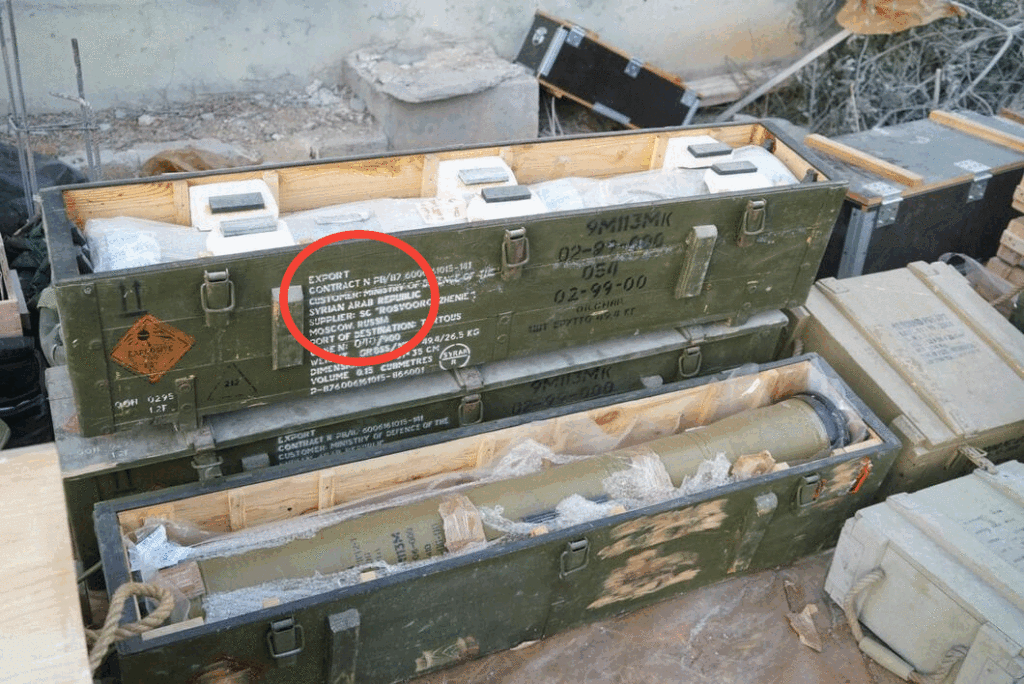Israeli soldiers in Lebanon have found large troves of Russian weapons in Hezbollah areas, surprising security officials who were unaware of the large cache of modern Russian arms Hezbollah had acquired in recent years, the Wall Street Journal reported on Tuesday.
The report quoted an IDF major who said that 60% to 70% of the weapons that troops found in southern Lebanon in the first days of the ground war were Russian-made. More recently, reservists told the WSJ that they continue to locate large amounts of Russian weapons inside Lebanon. Although the IDF was aware that Hezbollah had some older Russian-made weapons, their withdrawal from the country in 2006 meant that they lacked information from the ground in the almost two decades since then.
The findings confirm longstanding Israeli suspicions that Russia has aided Hezbollah in its fight against Israel by supplying sophisticated Russian arms.
The weapons, including modern Kornet antitank missiles manufactured as recently as 2020, were transferred to southern Lebanon from Russian stockpiles in Syria. Antitank missiles such as the Kornet are some of Hezbollah’s most effective weaponry in its war against Israel and have been used to kill numerous IDF soldiers.
Apart from the Kornets, soldiers found other Russian-guided antitank missile systems, including Metis, Konkurs, Fagots, and Saggers—all found less than a kilometer inside southern Lebanon. Some of the weapons were manufactured in 2020, and others, such as Saggers, had labels showing they were manufactured in the 1980s.
An IDF sergeant who is part of a medical evacuation team told WSJ that the Kornet, which can be shot from 7-to-8 kilometers away, has been Hezbollah’s most effective method of killing IDF soldiers.
Fabian Hinz, a military research fellow at the International Institute for Strategic Studies think tank in London, said that Hezbollah’s possession of short-range missiles honed its war capabilities against Israel, making it a far more deadly enemy than Hamas, which only had access to less-reliable Iranian imitations.
The discovery highlights Israel’s thorny dilemma on how to relate to Russia, which has deepened its relationship with the “Axis of Evil” since October 7 but still maintains a strong relationship with Israel. Israel must tread carefully regarding its ties with Russia due to its deep entrenchment in Syria, where Israel often carries out strikes against Iranian-backed militias and more recently has carried out strikes to halt the transfer of weapons to Hezbollah in Lebanon.
“Israel needs to be more assertive and defend its interests,” said Arkady Mil-Man, a former Israeli ambassador to Russia. “We must explain and convey to the Russians that we will no longer stand any assistance to Hezbollah and Iran that could hurt Israelis,” said Mil-Man, now a senior researcher at the Institute for National Security Studies in Tel Aviv.
The report quoted Israeli Foreign Minister Gideon Sa’ar, who recently highlighted Russia’s leverage over Hezbollah when he said that Israel hopes Russia will aid in the enforcement of a deal to disarm Hezbollah by preventing weapons smuggling from Syria to Lebanon.
“The principle that Hezbollah won’t be able to arm again or get new weapons systems or take them into Lebanon and to renew the threat to the extent it was before the war is vital to the success of any arrangement in Lebanon,” he said. “The Russians are present in Syria. If they agree with the principle, they can contribute to achieving this objective effectively.”
Russia became deeply involved in Syria after the civil war began in 2011 – sending weapons to President Bashar al-Assad’s forces and establishing its own weapons warehouses in the country.
Russian entrenchment in the country grew deeper in 2015, when Russian soldiers began fighting in Syria alongside Hezbollah soldiers, who had also come to Assad’s aid. WSJ quoted two Syrian security officials and an Arab official as saying that this strengthened the ties between the two countries, easing the way for Hezbollah to draw on Russian stockpiles in Syria whenever it needed more weapons, especially antitank, antiaircraft and antiship missiles.
(YWN Israel Desk – Jerusalem)












6 Responses
And as one of the 5 superpowers Bully Russia enjoys Veto power at the UN. Says that what about the UN.
Russia like Iran supplies Israel’s enemies and is a threat, yet for some reason Israel treats Iran as an enemy and Russia as an ally. Israel needs to join US sanctions against Russia and to provide weapons and intelligence to Ukraine.
Anonimity86, this is probably the worst advice possible, and Israeli leadership is smart to follow the opposite course.
Last thing Israel needs right now is to get enmeshed into the Ukraine war, which is already lost by Ukraine and her lame NATO allies.
America left weapons to the Taliban in Afghanistan
Russian support for Israels enemies goes back decades. Think Six Day War, Yom Kippur War….
I get the feeling Putin now wishes he could have some of it back.